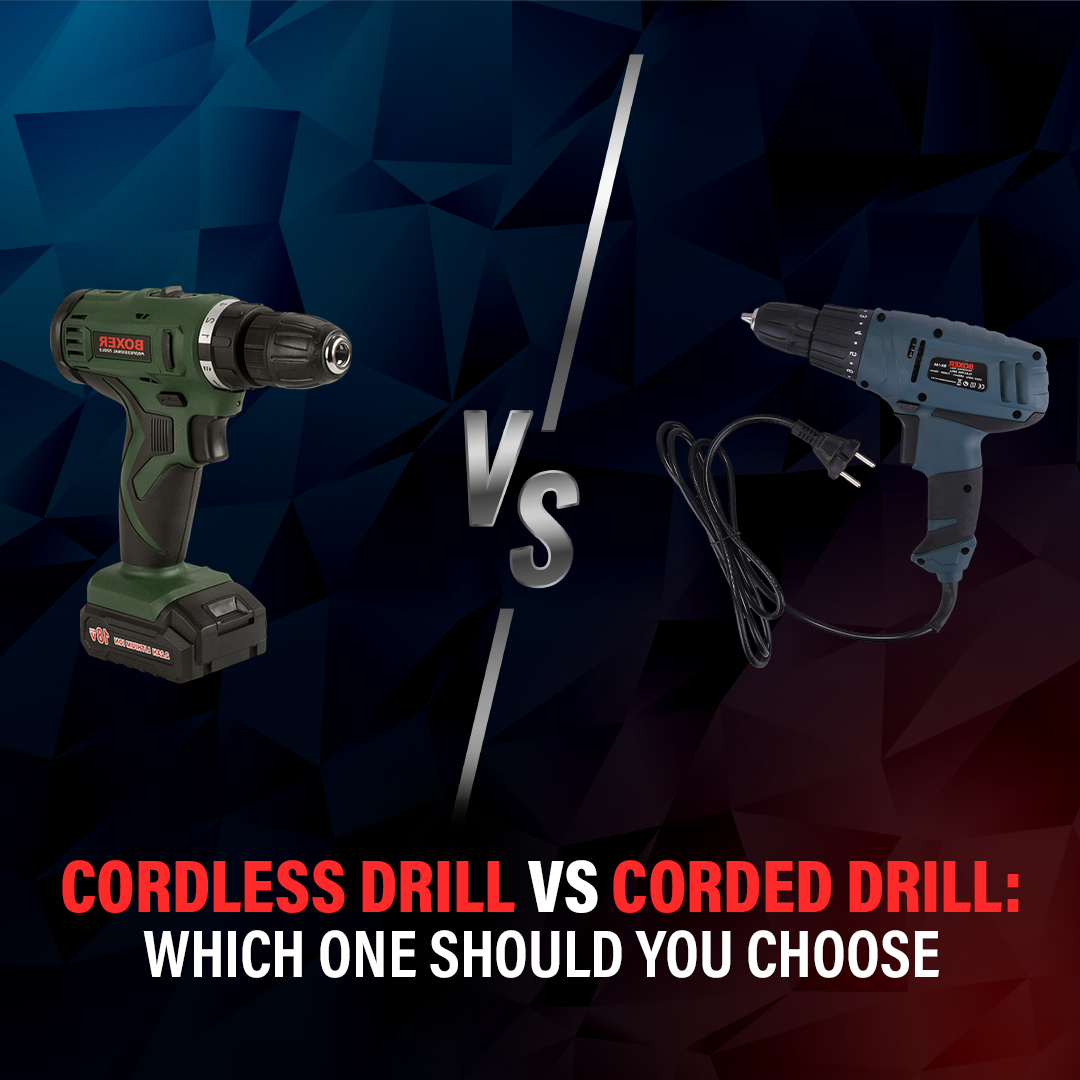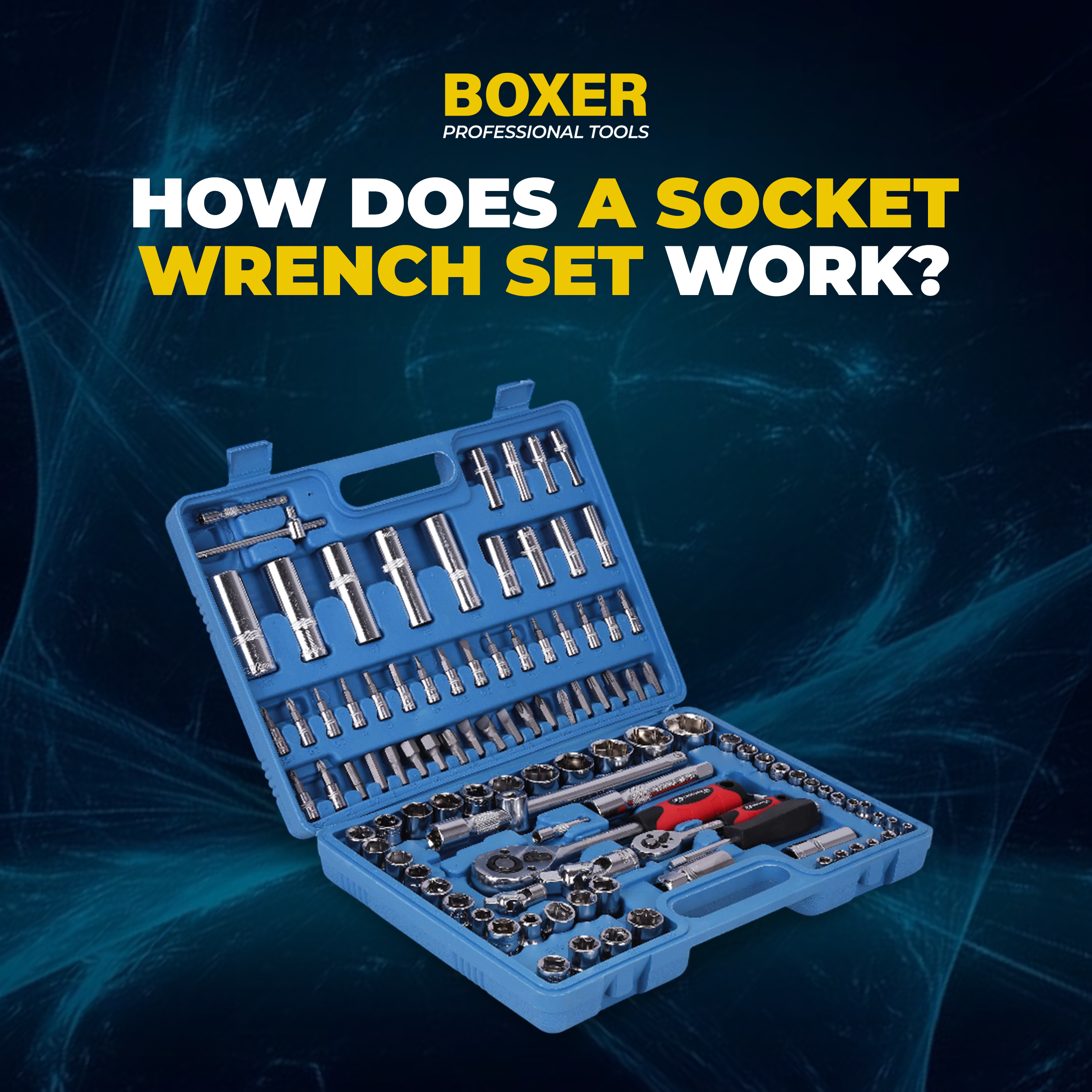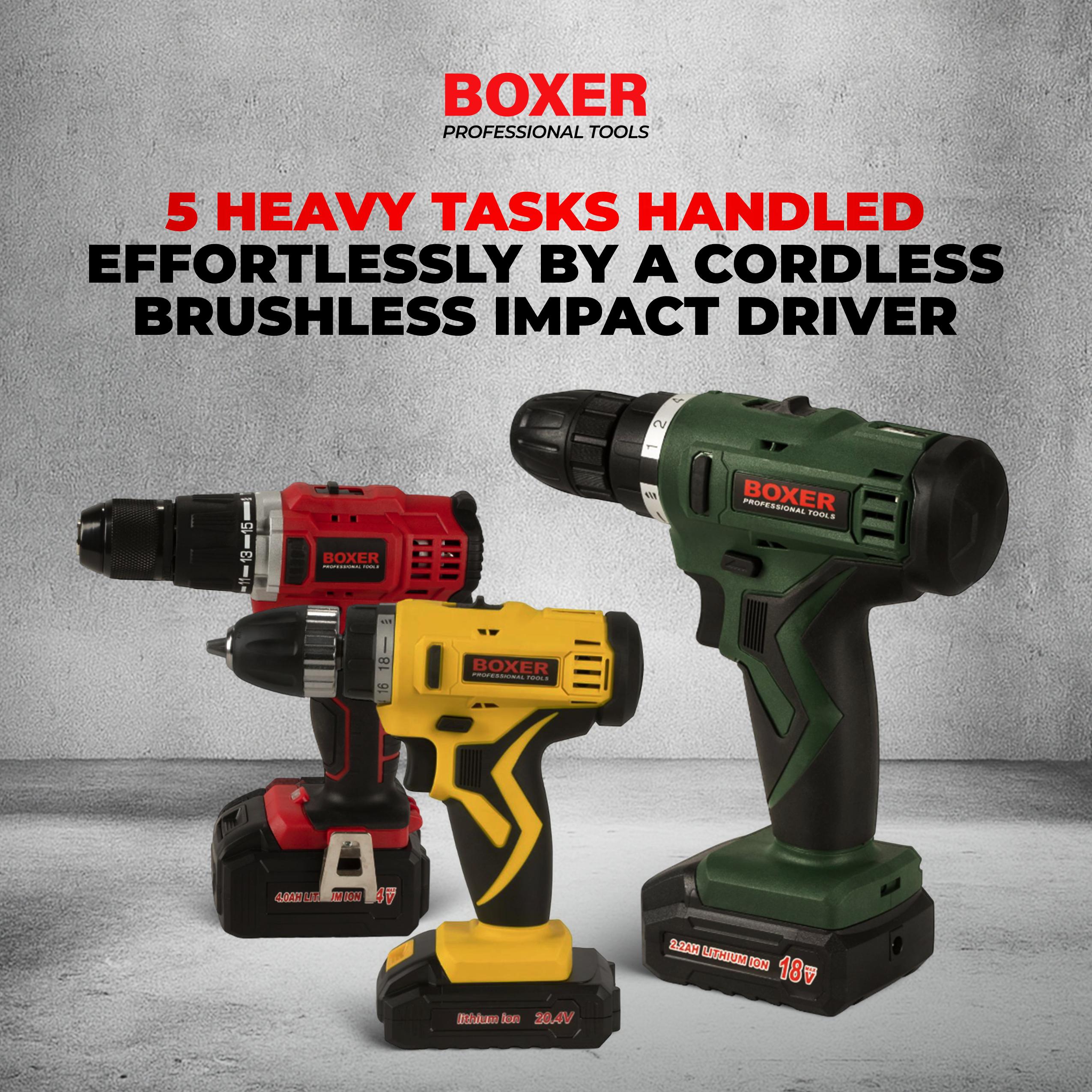
Cordless Drill vs. Corded Drill: Which One Should You Choose?
In the world of power tools, the debate between cordless and corded drills is a longstanding one. Each type of drill offers unique advantages and disadvantages, making the choice between them dependent on the specific needs and preferences of the user. Boxer Tools, a leading producer and wholesale distributor of professional and industrial tools across Europe, understands the importance of choosing the right tool for the job. In this comprehensive guide, we will delve into the features, benefits, and limitations of both cordless and corded drills to help you make an informed decision.
Understanding Cordless Drills
What is a Cordless Drill?
A cordless drill is a power tool that operates on battery power rather than being plugged into an electrical outlet. This type of drill is known for its portability and ease of use, making it a popular choice for both professional tradespeople and DIY enthusiasts.
Key Features of Cordless Drills
- Battery-Powered: Cordless drills are powered by rechargeable batteries, typically lithium-ion (Li-ion) or nickel-cadmium (NiCd). Li-ion batteries are preferred for their longer run time, lighter weight, and shorter charging periods.
- Portability: The absence of a power cord allows for greater mobility and flexibility, making cordless drills ideal for working in tight spaces or outdoor environments where access to power outlets is limited.
- Variable Speed Control: Most cordless drills come with adjustable speed settings, allowing users to control the speed and torque for different applications.
- Compact and Lightweight: Modern cordless drills are designed to be compact and lightweight, reducing user fatigue during prolonged use.
Benefits of Cordless Drills
- Mobility: The primary advantage of cordless drills is their mobility. Without the restriction of a power cord, users can move freely around the worksite, making them ideal for projects that require frequent repositioning or working in remote locations.
- Ease of Use: Cordless drills are easy to use, with quick and straightforward battery changes. This convenience is particularly beneficial for beginners or those who need a drill for occasional use.
- Versatility: Cordless drills are versatile tools that can be used for a wide range of tasks, including drilling holes, driving screws, and even mixing paint or drywall mud with the right attachments.
- Safety: The absence of a cord reduces the risk of tripping hazards, making cordless drills a safer option in cluttered or confined workspaces.
Limitations of Cordless Drills
- Battery Life: The most significant limitation of cordless drills is their reliance on battery power. Extended use can drain the battery, requiring recharging or battery replacement, which can interrupt workflow.
- Power and Torque: While cordless drills have improved significantly in power and torque, they still generally offer less power compared to their corded counterparts. This can be a limitation for heavy-duty applications.
- Cost: Cordless drills tend to be more expensive upfront due to the cost of batteries and chargers. Additionally, the need for spare batteries can add to the overall expense.
- Weight: Although modern cordless drills are designed to be lightweight, the added weight of the battery can make them heavier than corded drills, potentially causing user fatigue during extended use.
Understanding Corded Drills
What is a Corded Drill?
A corded drill is a power tool that operates by being plugged into an electrical outlet. These drills are known for their consistent power output and are commonly used in professional and industrial settings where reliable, continuous power is required.
Key Features of Corded Drills
- Continuous Power Supply: Corded drills are powered by electricity from an outlet, providing a constant and uninterrupted power supply.
- Higher Power and Torque: Generally, corded drills offer more power and torque than cordless drills, making them suitable for heavy-duty applications.
- Variable Speed Control: Like cordless drills, many corded drills come with adjustable speed settings to accommodate different tasks and materials.
- Lightweight Design: Without the need for a battery, corded drills are typically lighter than cordless drills, reducing user fatigue during extended use.
Benefits of Corded Drills
- Unlimited Run Time: The primary advantage of corded drills is their unlimited run time. As long as the drill is plugged in, it will continue to operate without the need for recharging or battery replacement.
- Consistent Power: Corded drills provide consistent power output, making them ideal for demanding tasks that require sustained power, such as drilling through dense materials like concrete or metal.
- Higher Torque: Corded drills generally offer higher torque, allowing them to handle heavy-duty applications more effectively than cordless drills.
- Cost-Effective: Corded drills are typically less expensive than cordless drills, as there is no need for batteries or chargers. This makes them a cost-effective option for those who require reliable performance without the added expense.
Limitations of Corded Drills
- Limited Mobility: The most significant limitation of corded drills is their reliance on a power outlet. This restricts mobility and can be inconvenient for projects that require frequent repositioning or working in areas without access to electricity.
- Cord Management: The presence of a power cord can be cumbersome, requiring careful management to avoid tangling or tripping hazards.
- Dependence on Power Supply: Corded drills are dependent on a stable power supply. In the event of a power outage, the drill becomes unusable.
- Inconvenience in Tight Spaces: The need for a power outlet and the presence of a cord can make using corded drills in tight or confined spaces more challenging.
Comparing Cordless and Corded Drills
Power and Performance
Cordless Drills
- Offer adequate power for most DIY and light to medium-duty tasks.
- Modern advancements have significantly improved their power and torque, but they may still fall short in comparison to corded drills for heavy-duty applications.
Corded Drills
Provide higher power and torque, making them suitable for heavy-duty tasks and continuous use.
Ideal for professional and industrial settings where reliable, consistent power is essential.
Mobility and Convenience
Cordless Drills
- Excel in mobility, allowing users to work in remote or confined spaces without the restriction of a power cord.
- Convenient for tasks that require frequent repositioning or working in areas without access to power outlets.
Corded Drills
- Limited mobility due to the need for a power outlet, making them less convenient for certain tasks.
- Ideal for stationary work or tasks that can be completed within reach of an electrical outlet.
Cost Considerations
Cordless Drills
- Higher upfront cost due to the need for batteries and chargers.
- Potential additional costs for spare batteries to ensure continuous operation.
Corded Drills
- Generally more cost-effective with a lower initial purchase price.
- No need for batteries or chargers, reducing long-term expenses.
Weight and Ergonomics
Cordless Drills
- Tend to be heavier due to the added weight of the battery.
- Modern designs focus on ergonomics to reduce user fatigue, but weight can still be a factor for extended use.
Corded Drills
- Typically lighter than cordless drills, as they do not require a battery.
- Easier to handle for prolonged periods, reducing user fatigue.
Suitability for Different Applications
Cordless Drills
- Best suited for DIY enthusiasts, home use, and light to medium-duty professional tasks.
- Ideal for projects that require mobility, such as assembling furniture, hanging pictures, or working in remote locations.
Corded Drills
- Preferred for professional and industrial applications that demand high power and consistent performance.
- Suitable for heavy-duty tasks, such as drilling through concrete, metal, or other dense materials.
Choosing the Right Drill for Your Needs
Assessing Your Needs
To determine whether a cordless or corded drill is the right choice for you, consider the following factors:
- Nature of Tasks: Evaluate the types of tasks you will be performing. For light to medium-duty tasks, a cordless drill may be sufficient. For heavy-duty applications, a corded drill is likely the better choice.
- Work Environment: Consider where you will be using the drill. If you need to work in remote locations or areas without easy access to power outlets, a cordless drill offers greater flexibility. For stationary work or tasks within reach of an outlet, a corded drill is suitable.
- Frequency of Use: If you require a drill for occasional use, a cordless drill provides convenience and ease of use. For regular, intensive use, a corded drill ensures reliable performance without interruptions.
- Budget: Factor in your budget, including the initial purchase price and any additional costs for batteries or chargers. Determine whether the convenience of a cordless drill justifies the higher upfront cost or if a corded drill meets your needs more cost-effectively.
Recommendations
For DIY Enthusiasts and Home Use:
- Cordless Drill: Ideal for its portability, ease of use, and versatility. Perfect for a wide range of household projects, from assembling furniture to hanging pictures.
For Professional Tradespeople:
- Cordless Drill: Suitable for tasks that require mobility and flexibility, such as working on job sites or in confined spaces. Ensure you have spare batteries to minimize downtime.
- Corded Drill: Essential for heavy-duty applications and tasks that require continuous power and high torque. Reliable performance makes it indispensable in professional settings.
For Industrial Applications:
- Corded Drill: Preferred for its consistent power output and ability to handle demanding tasks. Ideal for use in workshops, construction sites, and other industrial environments where reliable, high-performance tools are required.
Choosing between a cordless drill and a corded drill ultimately depends on your specific needs, preferences, and work environment. Both types of drills offer unique advantages and limitations, making them suitable for different applications.
Cordless drills excel in mobility and convenience, making them ideal for DIY enthusiasts, home use, and tasks that require frequent repositioning. Modern advancements have significantly improved their power and performance, but they may still fall short for heavy-duty applications. The higher upfront cost and the need for battery management are important considerations.
Corded drills, on the other hand, provide consistent power and higher torque, making them suitable for professional and industrial settings. They offer unlimited run time and are generally more cost-effective, but their reliance on a power outlet limits mobility. Cord management and the inconvenience of using them in tight spaces are potential drawbacks.
At Boxer Tools, we understand the importance of having the right tool for the job. As a leading producer and wholesale distributor of professional and industrial tools across Europe, we offer a wide range of cordless drills to meet your needs. Whether you are a DIY enthusiast, a professional tradesperson, or an industrial user, our high-quality tools are designed to deliver reliable performance and exceptional value.
Explore our selection of cordless drills at Boxer Tools, and equip yourself with the best tools to tackle any project with confidence and efficiency.
Copyright © 2026 Boxertools | Powered By Orance Media Group








